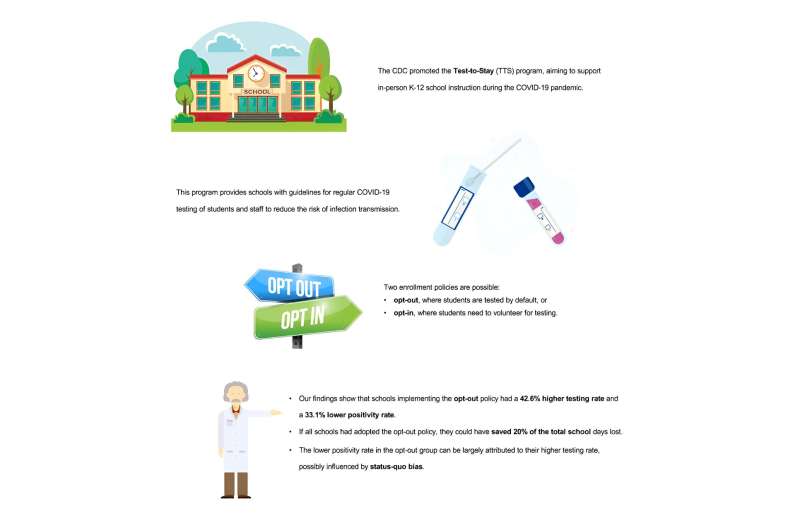This article has been reviewed according to Science X's editorial process and policies. Editors have highlighted the following attributes while ensuring the content's credibility:
fact-checked
peer-reviewed publication
trusted source
proofread
Default testing for COVID-19 in K-12 schools more effective than voluntary testing

A new paper co-written by a team of University of Illinois Urbana-Champaign business professors found that default testing of K-12 students for COVID-19 during the pandemic could have saved up to one out of every five school days lost to the coronavirus during the fall 2021 semester.
Schools adopting an "opt-out model"—in which students were regularly tested for COVID-19 unless they proactively declined or "opted out" of testing—experienced a 30% lower positivity rate than schools with a voluntary "opt-in" testing model, says a study co-written by Anton Ivanov and Ujjal Kumar Mukherjee, both professors of business administration at Illinois.
Mukherjee and Antonov's co-authors are Mehmet Eren Ahsen, Subhonmesh Bose, Sridhar Seshadri, and Sebastian Souyris of the University of Illinois Urbana-Champaign; Albert Charles England of OSF Healthcare Heart of Mary Medical Center; and Jacqueline Suriano and Ronald Watkins of SHIELD Illinois of the University of Illinois System.
"It's crucial during public health emergencies such as the COVID-19 pandemic to keep institutions such as schools open, and testing—along with masking, social distancing, and contact tracing—can play a critical role in keeping everyone safe," Mukherjee said.
"A robust testing program plays a very central role in that it enables students to be in school even if they have been exposed," Ivanov said. "We found that an opt-out versus an opt-in model made a huge difference during the COVID-19 pandemic in that the more schools tested for COVID-19, the more they were able to identify positive cases at an early stage, which reduced the risk of further propagation of the virus."
To evaluate the efficacy of the two consent models, the researchers analyzed data from more than 296,000 SHIELD Illinois saliva tests from 259 schools in the state of Illinois between Sept.-Nov. 2021.
SHIELD Illinois was the University of Illinois System's saliva-based COVID-19 test available to K-12 schools, colleges and universities, companies, and the public in the state of Illinois.
An analysis of data demonstrated that the opt-out consent model was associated with an 84% higher testing rate and a 30% lower test positivity rate than the opt-in model, the researchers said.
"Overall, our research points to the ineffective nature of the voluntary opt-in model," said Mukherjee, an expert in supply chain logistics and innovation in health care. "There's a clear separation between the default option and the voluntary option in terms of testing rates as well as infection risk."
"The main message here is that policymakers need to consider behavioral factors such as the status-quo bias when crafting policy that seeks to promote the adoption of practices aligned with anticipated public behavior—and that weighs heavily in favor of the default testing option," said Ivanov, a Deloitte Scholar at the Gies College of Business.
The findings were supported across multiple school types—elementary schools, middle schools, and high schools—from urban, suburban, and rural locations, according to the paper.
"We actually match schools by demographics and location to get an apples-to-apples comparison because there are differences in social norms across different ZIP codes in the state of Illinois," Mukherjee said. "What we found was a huge difference between opt-out and opt-in schools, with the data favoring the schools that chose the default testing option."
Additionally, the analysis demonstrated that the reduced positivity rates found in schools that chose the opt-out model could be attributed to their notably higher testing rates, the scholars said. If extrapolated across all schools, the lower positivity rate and higher testing rates associated with the opt-out model translated into a 20% reduction in the total number of lost school days due to infections over a period of 10 weeks early in the school year.
"The extra days are preserved by preventing subsequent infections through the higher testing rate in the opt-out model, in which students were tested by default," Ivanov said. "Again, the key difference comes from the status-quo bias, where people tend to choose the default option. If they have to sign up for something proactively, that's not as effective as when someone defaults to something. And that's true whether we're talking about saving for retirement or testing for COVID-19."
The study provides insights for policymakers, including schools, school districts, and state-level administrators, by urging them to develop strategies that promote the adoption of practices aligned with anticipated public behavior, the researchers said.
"To our knowledge, this is one of the first studies using field data across a large swath of K-12 schools to assess the test-to-stay policy implementation, and our results point to the overall effectiveness of adopting the opt-out consent model as a mitigation strategy," Mukherjee said.
The findings are published in the journal iScience.
More information: Anton Ivanov et al, COVID-19 test-to-stay program for K-12 schools: Opt-in versus opt-out consent model, iScience (2023). DOI: 10.1016/j.isci.2023.108770


















